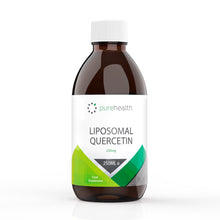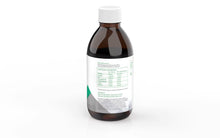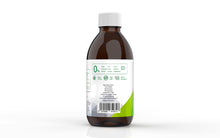An Almighty Anti-Inflammatory And Antioxidant
Quercetin is a powerful anti-inflammatory and antioxidant but has one big limitation: its extremely poor bioavailability¹ ². To help fix that, we’ve created Pure Health Liposomal Quercetin - one of the first of its kind! Our liposomal delivery system ensures the entire dose of pure Quercetin is safely transported through your gut and fully absorbed by your body. Plus, we’ve removed all the bulking agents, fillers, sweeteners, sugar, soy, additives, and artificial flavourings other supplements often contain so you get the purest Quercetin available today.
Congratulations! You are now on the waiting list, please check your inbox for our confirmation email!
Register Account
- 100% pure Quercetin that comes with no bulking agents, fillers, sweeteners, sugar, soy, additives, or artificial flavourings.
- Complete bioavailability with our liposomal delivery system.
- 250 mg of pure Quercetin per 10ml serving.
- Vegan and vegetarian-friendly, suitable for keto and low-carb diets.
- Gluten free, dairy free and non-GMO.
- Made in Germany.
What is Quercetin?

What is Quercetin?
Quercetin is a pigment found in fruits and vegetables like apples, onions, and grapes. It’s part of the family of flavonoids, which research has shown can have numerous health benefits³ ⁴, such as reduced risk of heart disease, cancer, and degenerative brain disorders.
Considered a powerful antioxidant⁵, Quercetin is able to scavenge free radicals damaging the body, though it also helps with other issues such as allergies. Quercetin is one of the more common antioxidants and the most abundant dietary flavonoid, being found in many foods, teas, and wines. Unfortunately, it’s estimated⁶ the average person consumes as little as 10 mg daily through food, which is often much lower than what studies exploring Quercetin’s health benefits use.

Beating The Bioavailability Boundary
One factor that limits Quercetin’s effectiveness is its notoriously poor absorbability¹ ². Our bodies can struggle to absorb the compound, with some estimates believing Quercetin has only 2% bioavailability. In other words, any Quercetin we take in may not be absorbed in a way that gives us the full benefit.
However, there is an answer. By encapsulating Quercetin in liposomes, we can now ensure this vital nutrient is much more readily absorbed. In fact, this type of Liposomal Quercetin is the first of its kind!
Liposomes are microscopic, fat-soluble “bubbles”. These bubbles encapsulate and transport nutrients to locations in the body where they’re most efficiently absorbed. The liposomes protect these nutrients from the gastrointestinal tract, helping the Quercetin molecules to survive unharmed until they arrive where they’re needed most - in our cells. In short, liposomal delivery dramatically increases Quercetin’s bioavailability and also decreases the risk of gut irritation.

How Much Quercetin Is Enough?
We recommend two teaspoons (10 ml) of Liposomal Quercetin every day. Each 10 ml dose contains 250 mg of natural Quercetin… and you would have to eat 2 kilos of apples to absorb the same amount!
Pure Health Liposomal Quercetin comes to you in an eco-friendly, recyclable 250ml glass bottle, and contains 25 daily serves.
4 Reasons To Take Quercetin Every Day

Reduce Inflammation
Research⁵ shows that high levels of free radicals can lead to inflammation and the issues associated with it, such as diabetes, asthma, atherosclerosis, and autoimmune diseases.
However, studies⁷ ⁸. also confirm Quercetin can help to reduce inflammation. One group⁹ of women with rheumatoid arthritis used Quercetin over a number of weeks and found early morning stiffness and pain reduced greatly.
Alleviate Asthma
The Allergy, Asthma & Clinical Immunology Journal has reported10 on the potential of Quercetin to reduce neutrophil and eosinophil recruitment, which in turn can help ease asthma. This is because neutrophils play a part in narrowing airways, while eosinophils are a type of white blood cells that can trigger severe asthma.
Additionally, Quercetin may also be able to reduce airway activity and mucus production, and assist in managing allergic diseases like rhinitis.


Relieve Allergies (Especially Hay Fever)
The anti-inflammatory properties found in Quercetin also deliver another benefit: allergy relief. Quercetin prevents immune cells releasing histamines, which are chemicals that can trigger allergic reactions. As a result, researchers suggest¹¹ that Quercetin can help reduce the symptoms of allergies, especially hay fever symptoms like a runny nose, watery eyes, hives, and facial swelling.
Lower Histamine Intolerance
Histamine intolerance is not actually a sensitivity or allergy to histamine - it’s a sign you’ve built up too much. Histamine is a chemical in the body that performs several important functions, like; passing messages to the brain, triggering stomach acid to support digestion and acting as part of the immune response after injury or allergic reaction
Histamine levels getting too high or not properly breaking down can show up in different ways, such as fatigue, headaches, nasal congestion, or even vomiting. Quercetin has anti-allergic functions that inhibit both the production and release of histamines¹².

References
References
1. Dabeek, WM. & Marra, MV., 2019, Dietary Quercetin and Kaempferol: Bioavailability and Potential Cardiovascular-Related Bioactivity in Humans. https://www.ncbi.nlm.nih.gov/pmc/articles/PMC6835347/
2. Rich, GT. et al., 2017, Towards an Understanding of the Low Bioavailability of Quercetin: A Study of Its Interaction with Intestinal Lipids https://www.mdpi.com/2072-6643/9/2/111/htm
3. Panche, AN. et al., 2016, Flavonoids: an overview https://pubmed.ncbi.nlm.nih.gov/28620474/
4. Koslowska, A. & Szostak-Wegierek, D., 2014, Flavonoids--food sources and health benefits https://pubmed.ncbi.nlm.nih.gov/25272572/
5. Boots, AW. et al., 2008, Health effects of quercetin: from antioxidant to nutraceutical https://pubmed.ncbi.nlm.nih.gov/18417116/
6. Bischoff, S., 2008, Quercetin: potentials in the prevention and therapy of disease
https://pubmed.ncbi.nlm.nih.gov/18827577/
7. Leyva-Lopez, N. et al., 2016, Flavonoids as Cytokine Modulators: A Possible Therapy for Inflammation-Related Diseases https://pubmed.ncbi.nlm.nih.gov/27294919/
8. Chaung, C. at al., 2010, Quercetin is equally or more effective than resveratrol in attenuating tumor necrosis https://pubmed.ncbi.nlm.nih.gov/20943792/
9. Javadi, F. et al., 2016, The Effect of Quercetin on Inflammatory Factors and Clinical Symptoms in Women with Rheumatoid Arthritis https://pubmed.ncbi.nlm.nih.gov/27710596/
10. Jafarinia, M. et al., 2020, Quercetin with the potential effect on allergic diseases https://aacijournal.biomedcentral.com/articles/10.1186/s13223-020-00434-0
11. Mlcek, J. et al., 2016, Quercetin and Its Anti-Allergic Immune Response. Molecules. https://pubmed.ncbi.nlm.nih.gov/18417116/
12. Hattori, M. et al., 2012, Quercetin inhibits transcriptional up-regulation of histamine H1 receptor https://pubmed.ncbi.nlm.nih.gov/23333628/






